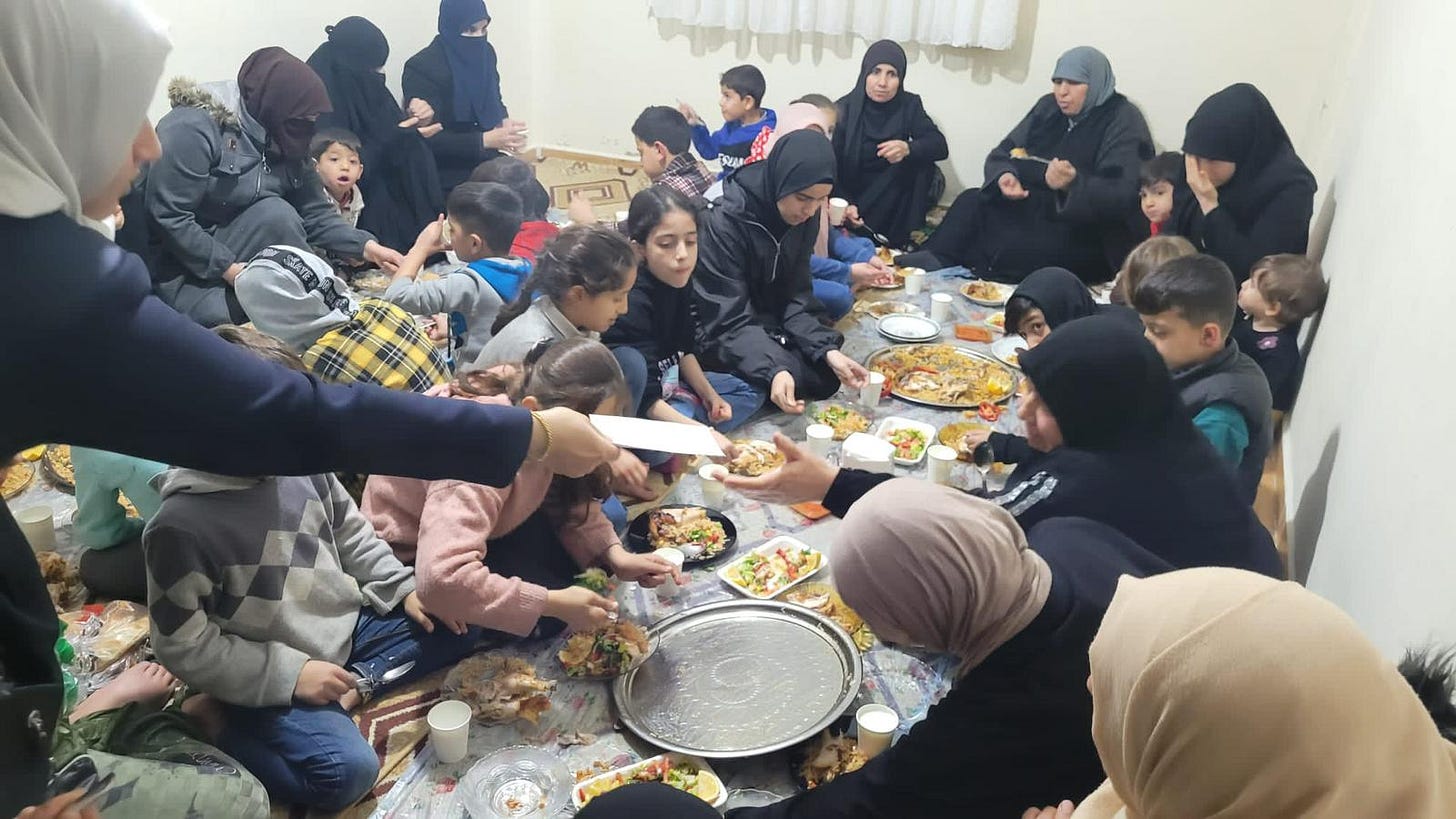Republicans want to sacrifice people like me in a Ukraine aid deal
Senators have reached a deal to pass urgently-needed Ukraine aid. But to get the compromise through Congress, legislators are prepared to sacrifice vulnerable humanitarian parolees like Ana.
Editor’s Note: We wanted to announce a victory for The Counteroffensive team. In Nov., we wrote a story about Mohammed, the Syrian boy burned in a Russian attack, and the orphans living along the Turkish border. Despite not asking for funds, our readers spontaneously organized to raise money, and The Counteroffensive offered to match the $ collected. Thousands of dollars then went directly to Mohammed’s surgery and the orphanage! This is why we love being part of this community. Thank you for being a reader!
Mohammed is currently waiting for his surgery. Meanwhile, this is from a dinner the orphanage was able to hold thanks to our fundraising:
Now, back to our issue today:
Ana’s nightmare began with a photo.
A Venezuelan civil servant posing with a government official from an opposition party.
The civil servant was Ana’s husband. Her husband was not conducting any official business, and the photo was never supposed to become public. The government official had just won a local election. Nevertheless, after the photo went viral on social media, everything changed.
Ana’s husband started to receive death threats from the government at their Venezuelan home. He was kidnapped by security forces and driven to the middle of nowhere, where he was beaten up.
They told him that he had to collaborate with the incumbent government, and they would return in a week to speak to him. Ana’s husband could not stand by a government he didn’t believe in, and so decided to flee to America.
When they came looking for him, and he wasn’t there, and they beat Ana in front of her children.
Ana considered seeking asylum in Colombia but believed it was not far away enough and she could still be at risk. After months of living with extreme caution and isolation, she decided to apply for humanitarian parole and join her husband in the U.S.
“I felt safe leaving my country but the feelings were more of helplessness, pain, frustration and a lot of sadness,” she said.
Ana is one of the 360,000 migrants per year that have been allowed to come to the U.S. by requesting humanitarian parole under a specific humanitarian parole program for Cuban, Haitians, Venezuelans and Nicaraguans that was created during Biden’s presidency. These reforms allow eligible migrants to come to America for a limited time — in hopes that they’ll return to their home countries when their legal status in the U.S. runs out. They are able to come only if they find a sponsor, somebody who can assure that their basic needs will be met.
However, the parole program that possibly saved Ana’s life could potentially be nixed, in order to placate Republicans into approving an aid package for Ukraine.
Republicans have insisted on combining the proposed Ukraine aid package with unrelated immigration policy changes, using the lives of people like Ana as leverage to force pro-Ukraine Democrats to yield. And despite originally campaigning on more humane asylum policies, Biden has vowed to “shut down the border” as soon as a Senate-led compromise bill can be passed by the U.S. Congress.

Just this weekend Democratic and Republican Senate negotiators have announced that they have come up with a deal. The text of the legislation is expected to be released by the end of today, with an initial vote next week.
“I know Ukraine is in a serious situation but we can’t trade one group of people for another group of people. There has to be another way,” Sandra McAnany, Ana’s American parole sponsor, said from her home in Wisconsin. “That funding should be separate.”
Sandra does not question whether Ukraine needs or deserves aid from the US, but to sacrifice the opportunity for people to better their lives in America doesn’t add up to her. She has sponsored 17 parolees in vulnerable situations from around the world.
Why she devoted her time and energy to taking in so many parolees is a complicated question to answer. First, Sandra talks about how her children had a lot of undocumented friends growing up and recalls how her children would warn their friends if they heard about an ICE raid.
“It’s kind of hard to explain…” She pauses and when her voice comes back it is thin and stuffy. You can almost hear it as her eyes welled up with tears.
“My husband died in 2016 and he always cared about people. He always made sure any kid that came over was watched over and that they were ok… I don’t know, I felt like it was sort of paying forward his legacy by helping.”
When I asked some of Sandra’s parolees for their thoughts on humanitarian parole programs being sacrificed in exchange for US aid to Ukraine, nobody argued against sending aid or challenged whether it was necessary.
Some, like Ana, declined to comment directly on the war in Ukraine, and others sidestepped the question, but all believed that just because aid was needed in Ukraine, did not mean that it was just to sacrifice humanitarian parole.
“The situation in Ukraine is very delicate, but I also know what many people go through to get [to the United States] and their reasons. I would feel sad if they closed the program as it is a legal, safe and regulated form of immigration that opened the doors for me,” said one Venezuelan woman, who asked to remain anonymous.
Another woman who has applied for humanitarian parole, but is still waiting in Cuba and also wanted to remain anonymous said: “I know that the war in Ukraine has no comparison, but things should not be mixed, all nations need opportunity regardless of whatever situation makes us different. The people of Cuba cry, children die of dengue… this program is worth it.”

Humanitarian parole has played a key role in the Biden administration’s approach to immigration and the US’ Southern border. Reforms made under Biden to humanitarian parole have allowed 30,000 migrants a month into the US through air ports of entry, which allowed them to take pressure off the U.S. Southern border.
The Biden’s administration's use of humanitarian parole has become the focus of GOP leaders' criticism of Biden immigration policy. Early last year, 21 GOP-led states filed a lawsuit against Biden claiming he had abused the authority to grant parole. They argued that parole was to be given on a case by case basis, as opposed to the Biden administration’s large-scale programs that are open to applications from anyone fitting the criteria and passing a background check.
Although the courts have not reached a verdict on this lawsuit, GOP leaders are now attempting to restrict humanitarian parole by withholding desperately needed aid for Ukraine, the effects of which have already begun to show. Deliveries of US aid have come to about a third of what they were in the summer of 2022 and risk reaching 10 percent by the end of this spring.
The compromise Biden is willing to make to send aid to Ukraine shows a significant shift from the border policies his administration has tried to enact in the last three years. However, with the election coming up, Biden is hoping to secure a win on border policy that would put him in better standing with moderate voters.

It is also precisely for this reason that House Republicans may refuse to pass the bill. Texas Representative Troy Nehls recently told CNN: “Let me tell you, I’m not willing to do too damn much right now to help a Democrat and to help Joe Biden’s approval rating.”
So despite lawmakers creating a bipartisan package specifically aimed at winning Republican support, it’s looking unlikely to pass.
However, other pro-deal Republicans argue that this may be their only chance to pass restrictive border policy legislation, as Democrats will not agree to similar new laws if Trump becomes President.
Republicans also risk becoming responsible for whatever happens if aid is not sent to Ukraine.
After the paywall: We analyze the likelihood of a Senate compromise passing the Congress; Ukraine hits a milestone in its destruction of Russia’s Black Sea fleet; and Alessandra takes us on a trip to the U.S.-Mexico border via Nogales, Ariz.
Keep reading with a 7-day free trial
Subscribe to The Counteroffensive with Tim Mak to keep reading this post and get 7 days of free access to the full post archives.







